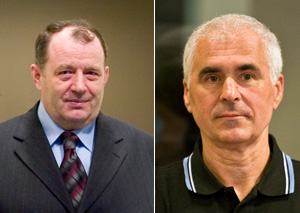Trial Chamber Judgement in the Stanišić and Župljanin case to be rendered on 27 March 2013

Mićo Stanišić i Stojan Župljanin
The Trial Chamber Judgment in the case of Mićo Stanišić and Stojan Župljanin, two former high ranking Bosnian Serb officials accused of crimes committed against non-Serb civilians in various areas of Bosnia and Herzegovina between April and December 1992, is scheduled to be rendered on Wednesday, 27 March 2013 at a time and in a Courtroom to be decided.
Mićo Stanišić was Minister of the Bosnian Serb Ministry of Internal Affairs in Bosnia and Herzegovina (RS MUP), in charge of public and state security, a position which gave him overall control of all police and security structures of the Bosnian Serb entity, the indictment alleges. Stojan Župljanin was Mićo Stanišić’s direct subordinate and the most senior police officer in the Autonomous Region of Krajina (ARK) in northwestern Bosnia and Herzegovina.
Mićo Stanišić and Stojan Župljanin are accused of persecution, extermination, murder, deportation, torture, cruel treatment and inhumane acts committed against non-Serb civilians in various areas of Bosnia and Herzegovina between April and December 1992. According to the indictment, Stanišić and Župljanin participated in a joint criminal enterprise (JCE) whose primary objective was to permanently remove Bosnian Muslims, Bosnian Croats and other non-Serbs from the territory of the planned Serbian state.
Among the alleged members of this criminal enterprise were Momčilo Krajišnik, Radovan Karadžić, Biljana Plavšić, General Ratko Mladić, leading members of the Yugoslav People’s Army (JNA)/Bosnian Serb Army (VRS) including General Momir Talić and leading members of regional and municipal crisis staffs including Radoslav Brđanin. The members of the JCE are alleged to have had effective control over the Serb forces which were involved in implementing the plan including, among others, members of the RS MUP, VRS, JNA, Yugoslav Army (VJ) and Territorial Defence (TO).
Stanišić is alleged to be criminally responsible for crimes committed in a number of municipalities in northwestern, eastern, central and northeastern Bosnia and Herzegovina including Prijedor, Sanski Most, Brčko, Pale, Zvornik and Višegrad. Charges against Župljanin cover the municipalities of northwestern Bosnia and Herzegovina only and include Prijedor, Sanski Most, Banja Luka, Donji Vakuf, Kotor Varoš, Ključ, Skender Vakuf and Teslić. Thousands were either killed or forcibly transferred from their homes as a result of the campaign.
The indictment also enumerates more than 50 different detention facilities, including Omarska, Keraterm and Trnopolje camps, set up by Bosnian Serb forces where captives were beaten, tortured, sexually assaulted, humiliated, harassed and psychologically abused. Female detainees were raped and many captives were killed or died as a consequence of the mistreatment.
The Prosecution alleges that, as a consequence of their positions of superior authority over the Serb forces, Stanišić and Župljanin were not only aware of the crimes committed by their subordinates but also encouraged and facilitated the commission of these by failing to take necessary measures to prevent such acts and punish the perpetrators.
Mićo Stanišić and Stojan Župljanin were initially indicted by the Tribunal in 2005 and 1999 respectively. Mićo Stanišić surrendered and was transferred into the Tribunal’s custody on 11 March 2005. Stojan Župljanin was arrested by Serbian authorities and brought to the Tribunal’s Detention Unit on 21 June 2008. The Trial Chamber granted the Prosecution’s motion to join the two cases in September 2008. On 20 November 2008, both accused pleaded not guilty to all charges.
The Prosecution began its case on 14 September 2009 and completed it on 1 February 2011 after calling 127 witnesses. The Defence case commenced on 11 April 2011 and was completed on 8 December 2011. The Defence called a total of 17 witnesses. The Chamber called three witnesses. The closing arguments took place from 29 May until 1 June 2012.
Since its establishment, the Tribunal has indicted 161 persons for serious violations of humanitarian law committed on the territory of the former Yugoslavia between 1991 and 2001. Proceedings against 136 have been concluded. Proceedings are currently ongoing for 25 accused.
The Judgement will be broadcast live on the Tribunal’s website
The Spokesperson for Registry and Chambers, Magdalena Spalińska, can be reached on
+31 (0)6 5127 1242 or +31(0)70 512 5066 and spalinska [at] un.org
For further information please call the Media Office at +31 (70) 512-8752 or -5343 or -5356.

